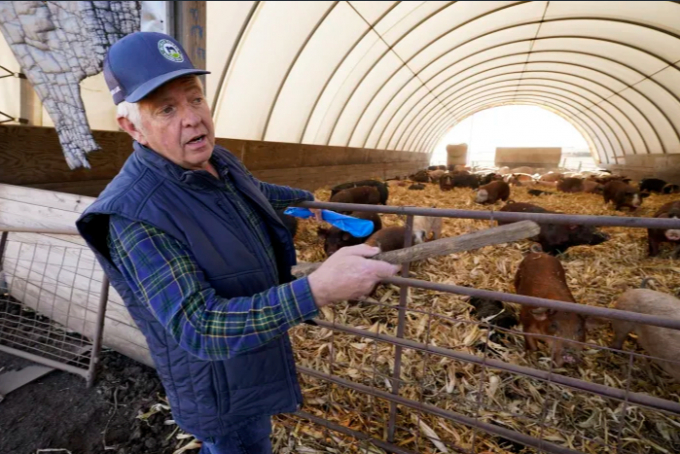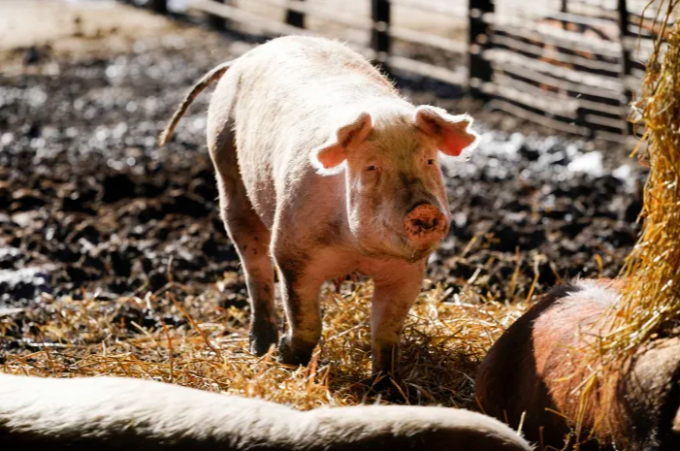June 19, 2025 | 14:37 GMT +7
June 19, 2025 | 14:37 GMT +7
Hotline: 0913.378.918
June 19, 2025 | 14:37 GMT +7
Hotline: 0913.378.918

Ron Mardesen talks about his hog farming operation, Thursday, Dec. 2, 2021, near Elliott, Iowa. Mardesen already meets the California standards for the hogs he sells to specialty meat company Niman Ranch, which supported passage of Proposition 12 and requires all of its roughly 650 hog farmers to give breeding pigs far more room than mandated by the law. Photo: AP
A coalition of California restaurants and grocery stores has filed a lawsuit to block implementation of a new farm animal welfare law, adding to uncertainty about whether bacon and other fresh pork products will be much more expensive or in short supply in the state when the new rules take effect on New Year's Day.
The lawsuit is the latest step in a tumultuous three-year process of enacting rules overwhelmingly approved by voters but that remain in question even as the law is set to begin. Since voters approved Proposition 12 by a 2-to-1 ratio in November 2018, state officials have missed deadlines for releasing specific regulations covering the humane treatment of animals that provide meat for the California market.
Most hog producers haven't made changes to comply with the law. And now a coalition of business owners is seeking more than a two-year delay.
“We’re saying this is not going to work,” said Nate Rose, a spokesman for the California Grocers Association.
While groups are working to delay the measure, the state has eased the transition to the new system. It has allowed pork processed under the old rules and held in cold storage to be sold in California in 2022, which could prevent shortages for weeks or even months.
As Josh Balk, who leads farm animal protection efforts at the Humane Society of the United States, put it, California residents need not fear “pork industry claims of the apocalypse."
Put simply, the law requires that breeding pigs, egg-laying chickens and veal calves be given enough space to stand and turn around. For pigs, that means they no longer can be kept in narrow "gestation crates" and must have 24 square feet (2.23 square meters) of usable space.
Producers of eggs and veal appear able to meet the new law, but hog farmers argued the changes would be too expensive and couldn’t be carried out until the state approved final regulations for the new standards. An estimate from North Carolina State University found the new standard would cost about 15% more per animal for a farm with 1,000 breeding pigs.
The National Pork Producers Council has challenged California's right to impose standards on businesses in other states, but so far those efforts have failed.
California is the nation’s largest market for pork, and producers in major hog states like Iowa provide more than 80% of the roughly 255 million pounds (115 million kilograms) that California’s restaurants and groceries use each month, according to Rabobank, a global food and agriculture financial services company.
Without that supply, it’s unclear if a state that consumes about 13% of the nation's pork supply will have all the meat it demands. The North American Meat Institute, an industry group, said packers and processors “will do their best to serve the California market."
“What will happen in California? I don’t know,” said Michael Formica, the general counsel for the National Pork Producers Council. “One thing we know is there will be finite supplies to sell there.”
Adding to the uncertainty is the lawsuit filed last month in Sacramento County by the California Grocers Association, California Restaurant Association, California Hispanic Chambers of Commerce, California Retailers Association and Kruse & Sons, a meat processor. The suit seeks a 28-month delay until final regulations for enforcement of the rules are officially adopted.
California's agriculture and health departments have said the voter-backed measure didn't give them enough time to approve final regulations. The agencies were still accepting public comments for revisions in December. That means it could be months before final rules are approved.
Given that delay, the groups claim in the lawsuit that they can't be sure they're complying and could be subject to penalties stipulated in the law.
“Our concern is the uncertainty,” said Rose, of the grocers association. He said a judge has scheduled a hearing for March, but the group is pushing for an earlier date.
If the law takes effect Jan. 1, it’s possible the state could avoid immediate shortages or steep price increases because the industry has about 466 million pounds (211 million kilograms) of pork in storage. Not all of that meat can be sent to California, of course, but when combined with new supplies from processors that meet the new standards, it should meet at least some of the demand.
If there is a disruption, it “would be significantly smoothed,” said Daniel Sumner, a professor at the University of California-Davis, who teamed with colleagues to study the price and supply implications of Proposition 12.

A hog walks in a holding pen on the Ron Mardesen farm, Thursday, Dec. 2, 2021, near Elliott, Iowa. A coalition of California restaurants and grocery stores has filed a lawsuit to block implementation of a farm animal welfare law, adding to uncertainty about whether bacon and other fresh pork products will be prohibitively expensive or available at all in the state when the new rules take effect on New Year's Day. Mardesen already meets the California standards for the hogs he sells to specialty meat company Niman Ranch, which supported passage of Proposition 12 and requires all of its roughly 650 hog farmers to give breeding pigs far more room than mandated by the law. Photo: AP
While an earlier study projected bacon prices soaring by up to 60% in California, a UC-Davis report estimated that the uncooked pork prices rising eventually by a more manageable 8% in California.
Massachusetts has approved a similar animal welfare law that takes effect next month, but state lawmakers are considering a one-year delay because of supply concerns.
The accuracy of the California estimates could depend on how many farmers adopt the new standards and how long the transition takes.
Iowa farmer Ron Mardesen already meets the California standards, and for much of the year gives sows free rein to roam through large areas of his farm about 100 miles (160 kilometers) southwest of Des Moines.
With so much room, “They’re like a bunch of big, old sisters,” he said. “You can tell they’re happy. No one is squealing or crying.”
Chris Oliviero, general manager of Niman Ranch, a specialty meat company in Westminster, Colorado, said he hopes California’s new rules help change a system he calls “lower cost at any cost.” Although Niman charges more for its pork, he said he hopes the new California rules help limit the environmental consequences of large-scale animal agriculture.
“There is volatility in the markets, so I understand the fears that comes with that, but I also think most large agricultural companies have shown that when they put their mind to it they’re very capable of solving complex problems,” Oliviero said.
(AP)

(VAN) Extensive licensing requirements raise concerns about intellectual property theft.

(VAN) As of Friday, a salmonella outbreak linked to a California egg producer had sickened at least 79 people. Of the infected people, 21 hospitalizations were reported, U.S. health officials said.

(VAN) With the war ongoing, many Ukrainian farmers and rural farming families face limited access to their land due to mines and lack the financial resources to purchase needed agricultural inputs.

(VAN) Vikas Rambal has quietly built a $5 billion business empire in manufacturing, property and solar, and catapulted onto the Rich List.

(VAN) Available cropland now at less than five percent, according to latest geospatial assessment from FAO and UNOSAT.

(VAN) Alt Carbon has raised $12 million in a seed round as it plans to scale its carbon dioxide removal work in the South Asian nation.

(VAN) Attempts to bring down the price of the Japanese staple have had little effect amid a cost-of-living crisis.